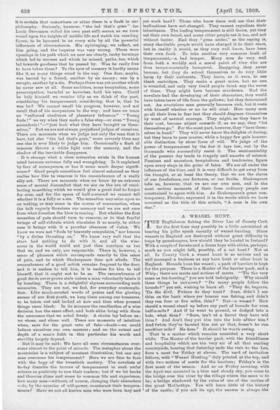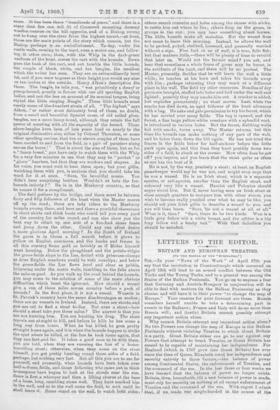A WEASEL HUNT.
THE Englishmen fishing the River Lee of County Cork for the first time may possibly be a little astonished at hearing his ihhie speak casually of weasel-hunting. Since weasels in England are destroyed without great difficulty in traps by gamekeepers, how should they be hunted in Ireland? With rt. couple of ferrets and a dozen boys with sticks, perhaps ; much as you might talk, possibly, of a rat hunt I' Not at all. In County Cork a weasel hunt is as serious and as well managed a business as any hare bunt or other hunt in England. Hounds hunt the weasel ; a pack of harriers is kept for the purpose. There is a Master of the harrier pack, and a Whip; there are meets and notices of meets. "'Tie the very same as fox-bunting," you are told indulgently. Why should these things be unknown ? "Do many people follow the hounds?" you ask, wishing to learn all. "They do, begorra. 'Tis the divil. Fwhere do they hunt? Sure, didn't I see tbim on the bank where yer honour was fishing, and didn't they run four or five miles, thin ?" But—a weasel ? How should a weasel stand up before any pack of hounds for even balta-mile P And if be went to ground, or dodged into a hole, what then? 'Sure, isn't ut a ferret they have wid thim ? And don't they put him into the hole aftber hint? And fwhin they've berated him out av that, doesn't he run anodther mile ? He does." It should be worth seeing.
That is a matter which remains unsettled a very short while. The Master of the barrier pack, with the friendliness and hospitality which are the very air of all that smiling countryside, hearing that Saturday ends the visit to the Lee, fixes a meet for Friday at eleven. The card of levitation follows, with "Weasel Hunting" duly printed at the top, and with two notices of meets for the harriers; Friday's is the first meet of the season. And so on Friday morning, with the April sun mounted in a blue and cloudy sky, you come to the bridge over the river by the village where the meet is to be; a bridge shadowed by the ruins of one of the castles of the great McCarthys. You will learn little of the history of the castle; if you ask its age, the answer is always the same. It he been there " hunsilireds of yours," and there is .a story .(leut few can tell it) of Cromwell mounting dummy weoden cannon on the hill opposite, and of a Bishop swung out to hang over the river from the highest turret,—at least, those are the main points of the story which remain, but the Bialiop perhaps is an embellishment, To-day, • under, the castle walls, coming to the meet, runs a motor-car, and follow- ing it other cars; thou, with the Whip in the dark-green uniform of the hunt, comes the cart with, the hounds. Down goes the back of the cart, and out tumble the little bounds, ten couple of black, white, and tan beagles, the smallest which the writer has seen. They are an.extraordinarily level lot, and if you were to guess at their height you would say nine or ten inches at the outside. Henry Allen's description fits thens The beagle, he tells you, "was primitively a dwarf or poney-bound, greatly in favour with our old sporting English ladies, and not the less on account of its musical tongue, being styled the little singing Beagle." These little hounds must surely come of the dwerfeat strain of all. "The highest," says Aiken, or rather most delicately bred of these, no doubt,
from a small and beautiful Spaniel cross, of old called glove-
beagles, are a mere fancy-breed, although they retain the full pewer of scenting with all the sagacity of the hound. These glove-beagles have been of, late years bred so nearly to the original diminutive size, either by Colonel Thornton, or some other sporting curioso, that ten or eleven couples of them have been carried to and from the field, in a pair of panniers slung across the horse!" That is about the size of theta), but as for a." fancy-breed," you have only to watch them with the Whip for a very few minutes to see that they.may be "pocket" or "glove" harriers, but that they are workers and stayers. As for voice, you must wait to hear them open; but your gillie, watching them with you, is anxious that you sbotild take his word for it . at once. "Sure, 'tie beautiful music. You didn't hear annything betther. Wouldn't ut bate the fox- hounds intirely ? " He is in the Musketry country,. so that he means it for a compliment.
. The field gathers by the bridge, and there must be between forty and fifty followers of the hunt when the Master moves off up the road ; there are lady riders to the Muskerry bounds among them, and here and there a youthful chasseresse in short skirts and thick boots who could tell you every yard of the country for miles round, and can also show you the best way to climb up one side of p five-foot stone fence and jump down the other. Could any one afoot deaire e. more glorious April morning P In the ,Seuth of Ireland the gorse is in bloom a full mouth before it glows to yellow on English commons, and the banks and fences in all this country flame gold as lavishly as if Midas himself went hunting. Below the ploughland and the potato-ridges the grass-fields elope to the Lee, dotted with primrose-clumps as drier English meadows would be with cowslips.; and below the grass-fields the Lee flows level and clear as pebble, brimming under the castle walls, tumbling to the falls above
the salmon-pool. As you walk up the road behind the bounds,
you may come to the solution of some of the more obvious difficulties which beset the ignorant. How should a weasel give a run of three miles across country before a pack of hounds ? In the first place, it is not a weasel. Weasels in St. Patrick's country have the same disadvantages as snakes ; there are no weasels in Ireland. Instead, there are stoats, and You are out to find a stoat to-day. But even a stoat—how should a stoat take you three miles ? The answer is that you are not hunting him. You are bunting his drag. The stoat
travels out at night to kill, and before be kills be has come a long way from home. When he hats killed, he g.oes pretty straight home again, and it is when the hounds happen to strike the spot where be killed, or the line he took home twain, that they run fast And far. It takes a good man to be with them, you are told, when they are running the line of a home- travelling stoat; otherwise,, when they come on the stoat himself, you get pretty hunting round three sides of a field,
• perhaps,,but nothing very fast. But all this you are to gee for yourself, and presently, when bounds have been taken over half-a-dozeu fields, and those following who came out in thick homespuns have begun to look at the clouds near the sun, there is &aka whimper and then a lifting chorus at the base of a loose, long, rambling stone wall. They have marked Wei in the wall, and so to the wall come the ,field, to wait tiptil he shall leave it. Some stand on the wall, to watch ht)th .ehlee;
others search crannies and holes among the stones with sticks, to rattle hint out where he lies; others drop on the grass, in groups in the sun: you way hoar something about horses. The little bounds make all melodies. But the weasel does not mean to leave this .morning. Instead, he allows the wall to be probed, poked, stabbed, loosened, and generally worried without a sign. Five foot or so of wall, it is true, falls flat; but that matters little,—there will be plenty of time to rebuild that later on. Would not the farmer mind P you ask, and hear that sometimes a whole fence of gorse may be burnt, in the accidents of the bunt, and there will be no protest. The Master, presently, decides that he will leave the wall a little while; he touches at his horn and takes his hounds away with him ; perhaps returning they may mark at a different place in the wall. The field try other resources. Bundles of dry gorse are brought, stuffed into holes and laid under the wall and lighted ; possibly they may smoke him out. A cracker is added, but explodes prematurely; no stoat moves. Last, when the smoke has died down, an aged follower of the hunt advances with al.).ag. He asks and gets permission to try his ferret, which be has carried over many fields. The bag is opened, and the ferret, a fine large yellow-white creature with a splendid coat, is introduced to 'various holes. But the ferret, disliking walls hot with smoke, .turns away, The 'Master returns, but this time the hounds can make nothing of any part of the wall, and be takes them down the bill again. He has not tried the fences in the .fields below for half-an-hour before the little pack open again, and this time. they hunt prettily down two sides of a field, tO ebeck at the corner. How often does be get off? you inquire, and you learn that the stoat quite ,as often as not has the best of it.
He is not, by the way, precisely a stoat; at least, an English gamekeeper would say he was not, and might even urge that he was a weasel. He is an Irish stoat, which is a separate species, or sub-species, smaller than the English stoat, and coloured very like a weasel. Hamlet and Polonius should argue about him. But if, never having seen an Irish stoat at close enough quarters to compare bum with other stoats, you wish to become really puzzled over what he may be like, you should ask your Irish gillio to describe A weasel to you, and you will then learn. "Sure, 'tie not a weasel at all, at all." What is it then P "Sumo, there do be two kinds. Wan is a little grey fellow wid a white breast, and the odther is a big foxy fellow wid a bushy tail." With that definition you should be satisfied.























































 Previous page
Previous page